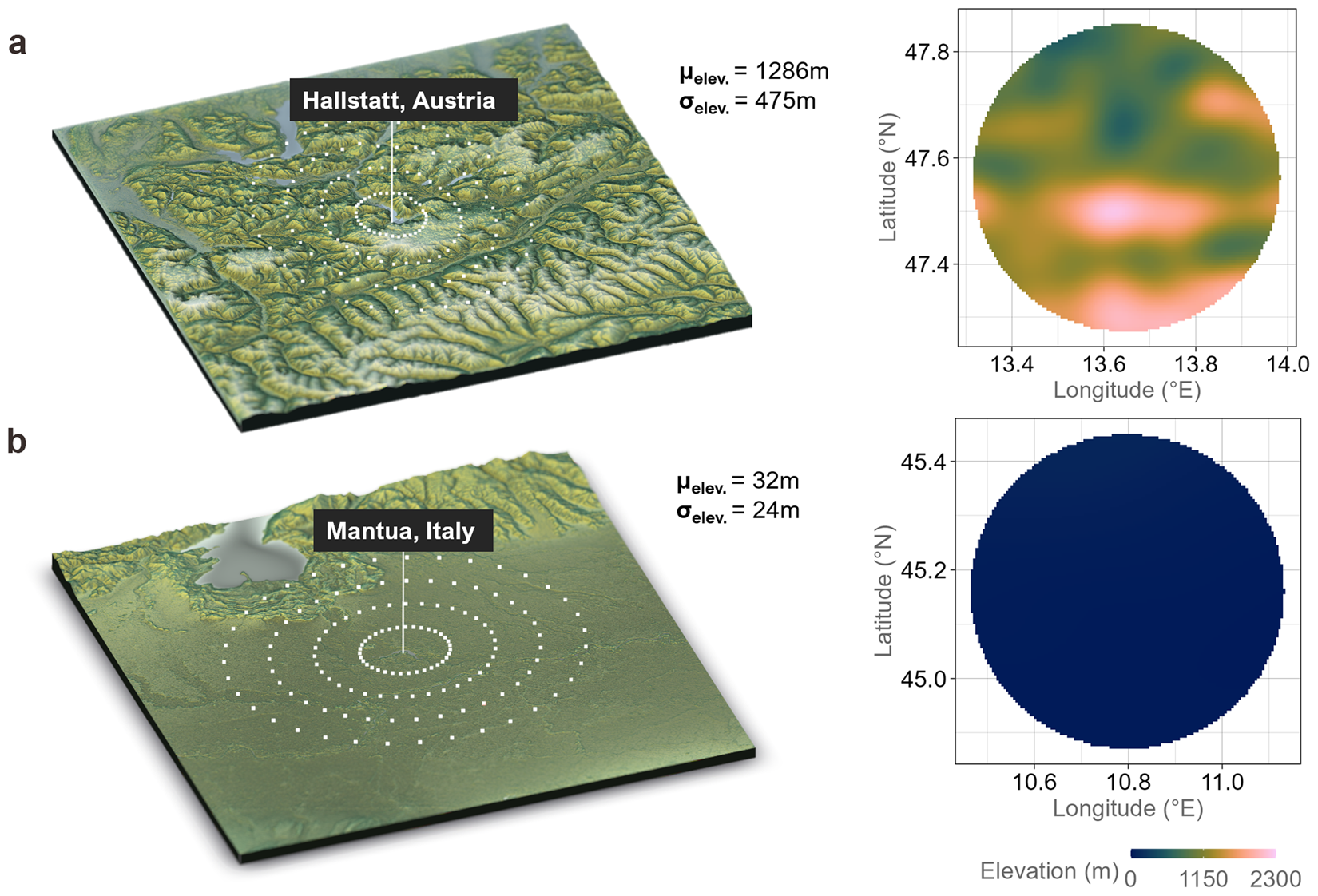A Novel View on Earth: First Detailed Global Database on Climate, Vegetation & Topography Now Publicly Available
Worldwide satellite data analyzed, structured and published by Karl Landsteiner University of Health Sciences, Austria.

Krems (Austria), 24. October 2023. With ecolo-zip, a worldwide unique database with detailed information on terrain forms, plant cover and climatic conditions at 1.5 million locations in 94 countries and regions has now been created and published. Thus, for the first time, science & research – as well as social and political institutions – have at their disposal a data source that describes the biogeophysical environment of mankind in unrivaled spatial resolution. This information is an invaluable resource for understanding the influence of spatial environments on humans and their behavior, psyche, and even political decisions. Two sets of global satellite data were used by the Department of Psychology and Psychodynamics at Karl Landsteiner University of Health Sciences (KL Krems) to create the database.
People are shaped not only by their social environment, but also strongly by their biological, geographical and physical (so-called biogeophysical) surroundings. In fact, these influences have long been studied in numerous scientific disciplines. For example, there is now good evidence that the psyche and personality of humans are influenced by the nearby topography. Or, that it also affects trade routes, settlement, and even outbreaks and duration of civil wars. Vegetation and climatic conditions have an equally strong influence on humans. Studies of these influences rely on accurate, high-resolution, comprehensive data of humanity's biogeophysical environment – and these have been scarce and limited. With ecolo-zip, scientists at KL Krems have now created a global data source for this purpose that is more comprehensive and high-resolution than anything that has existed before.
220 Million Data
"ecolo-zip is the first database with detailed topological and environmental data for more than 1.5 million postal codes in 94 countries and regions, " emphasizes Dr. David Willinger, researcher of the Division of Psychological Methodology at KL Krems. "To create it, we processed 220 million individual pieces of data. This has made ecolo-zip an incredibly rich and high-resolution description of the human ecosphere – and we're excited to make it available without restriction."
In fact, Dr. Willinger and Head of the Division Prof. Stefan Stieger, together with their colleague, Dr. Friedrich M. Götz (Dept. of Psychology, University of British Colombia, Vancouver, Canada), used data sets from two sources for the new database: the Shuttle Radar Topography Mission (SRTM) and the Advanced Spaceborne Thermal Emission and Reflection Radiometer (ASTER). In doing so, the SRTM data allowed the relief of the Earth's surface to be fed into the database at a resolution of 3 arcseconds (that's 90 m). The ASTER data in turn allowed the extension of ecolo-zip with information on vegetation and climate.
Navigating the Data
The third data set integrated into ecolo-zip was 1.5 million postal codes with their corresponding geodetic data (i.e. coordinates in longitude and latitude). These were taken from the publicly available geonames.com database. Using a computer model developed by the three authors themselves, all data were then related to each other. In total, ecolo-zip now includes for the mentioned 1.5 million locations the most accurate information on location coordinates, average elevation above sea level, density of vegetation cover and average surface temperature of the land (and their standard deviation during the ASTER data collection in 2000-2008) as well as the ratio of land to water at the respective location.
The research team has made the database available immediately at https://doi.org./10.17605/osf.io/wcjad . Dr. Willinger comments: "Wherever we humans go, we inevitably interact with our environment. All our personal, social and cultural behavior takes place against this background. Data like ecolo-zip now makes available are therefore of central importance to better understand these interactions. We and KL Krems therefore invite scientists from all disciplines to use ecolo-zip free of charge and without restriction."
Visualizations available at: https://media.springernature.com/full/springer-static/image/art%3A10.1038%2Fs41597-023-02579-0/MediaObjects/41597_2023_2579_Fig2_HTML.png
Original publication: https://kris.kl.ac.at/en/publications/ecolo-zip-a-global-rich-and-granular-characterization-of-biogeoph




